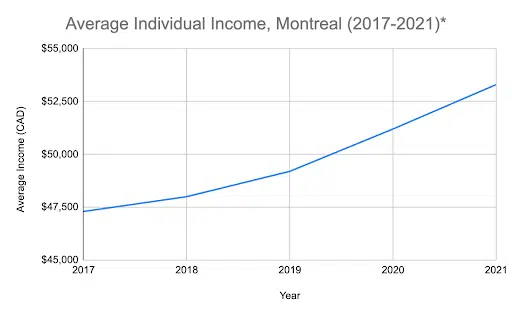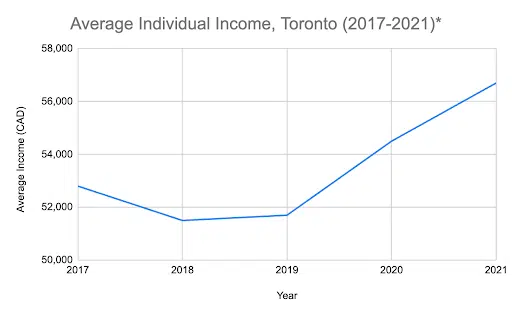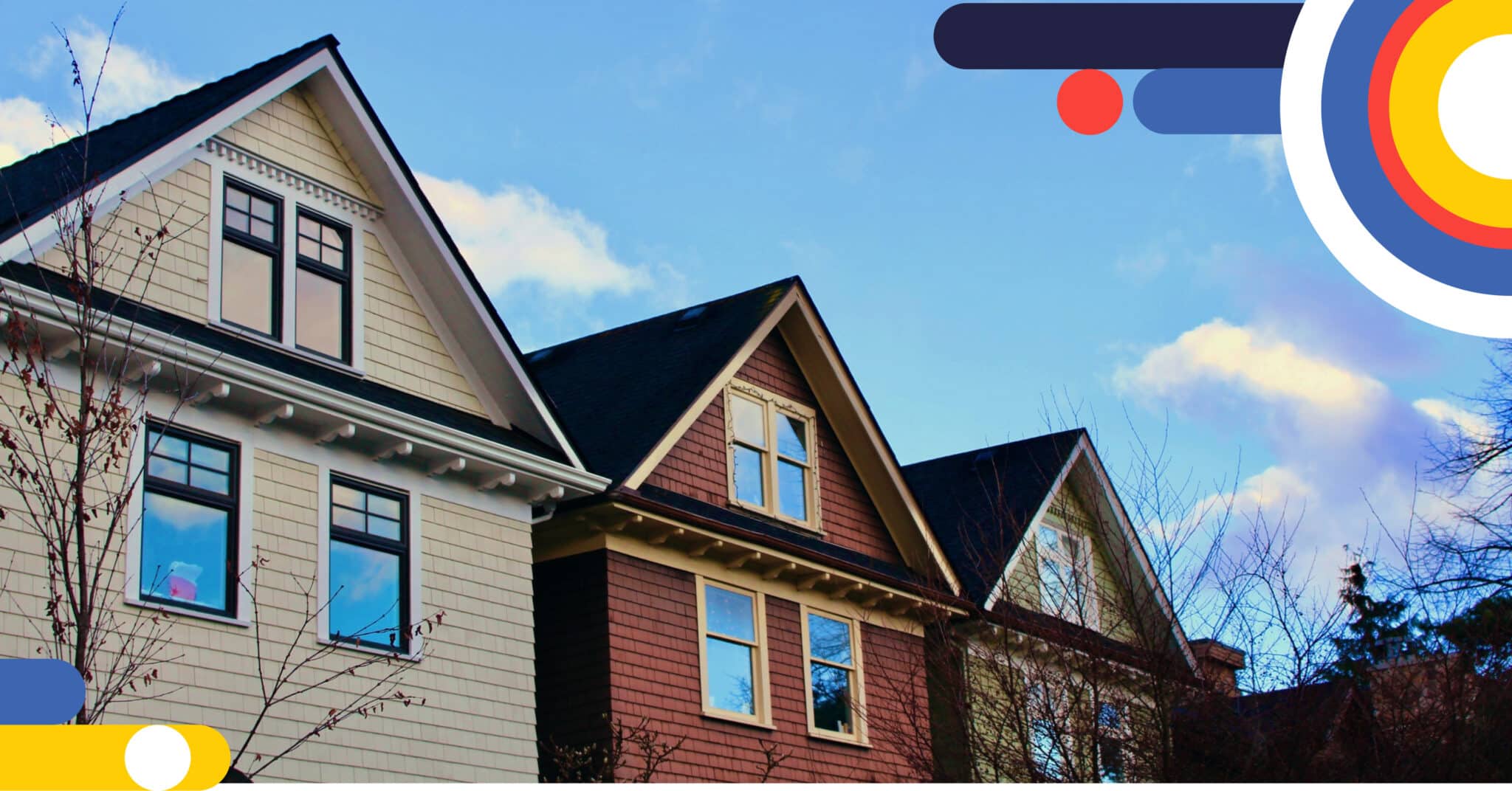Where is Better to Live: Montreal or Toronto?

Table of contents
Montreal and Toronto are two of Canada’s oldest, largest, and most famous cities. Both cities have been at the forefront of Canadian culture since their founding, from world-renowned sporting rivalries to famous artists. But what are they like to live in?
This guide breaks down some of the main things to consider, such as neighbourhoods, the cost of living, average incomes, and more, if you’re looking at a property in Toronto or Montreal.
Key Takeaways
- The average cost of a home in Toronto is currently $1,164,400. Comparatively, the average cost of a home in Montreal is currently $517,600.
- The population of metro Toronto is roughly 6.3 million. Comparatively, Montreal’s population is about 4.3 million.
- Montreal and Toronto have several unique neighbourhoods with varying median incomes and costs of living.
Montreal vs Toronto: Key Differences
The differences between Toronto and Montreal go back to one of the major fault lines in Canadian history: the English versus French-speaking worlds. In the early days of Canada’s Confederation, English-speaking Canada was laid out to become a country influenced by both British and American culture, becoming a kind of centre point of the two.
In Toronto, this is evident in the city’s style and culture. Montreal, being one of the first cities to be claimed by the French colonists, has developed along more distinctly European lines. This key difference is important as it underpins many of the smaller details about each city.
There are many legislative and regulatory contrasts between the two cities because Toronto lies in Ontario, whereas Montreal is in predominantly French-speaking Quebec. Each province and municipality has their own set of laws, taxes, and other differences, such as the first-time home buyer programs available.
Toronto is well-known for its movie and television industry and appears in several famous shows and films. Many of them have used Toronto as a stand-in for New York City. Indeed, the downtown core resembles Manhattan, and much of Toronto’s architecture mirrors that of New York.
Toronto is a busy and constantly bustling city with many different neighbourhoods, from Little Italy to Chinatown and the towering skyscraper of the financial district. With a population of around 6.3 million in the GTA, Toronto is the larger of the two cities and has a distinctly American feel.
With Canada’s only NBA team, a world-renowned baseball team, the Toronto Blue Jays, and the Toronto Maple Leafs hockey team. Toronto is akin to larger North American cities like Chicago or New York.
Montreal, the smaller of the two cities with a population of around 4.3 million, retains a North American feel in its downtown core. This quickly transforms into a more European-style city reminiscent of parts of central and northern France once you leave the highly built-up areas.
While it is the largest city in predominantly French-speaking Quebec, it’s also the most anglophone city in the province. English speakers will be able to get by here; however, it always helps to learn French, particularly if you’re planning to venture to less populated parts of Quebec.
Both cities have many large parks and other natural features, like Toronto’s lakefront and islands or the banks of the St Lawrence River and canals in Montreal. Given the large surface area of Toronto’s industrialized regions, Montreal is perhaps better situated in terms of immediate access to nature. Toronto has large parks like High Park and the Beaches to compensate for this.
Cost of Living vs Average Salary for Montreal & Toronto
Below is a breakdown of some metrics for the cost of living in Montreal and Toronto, plus the average income for individuals in both cities.
In general, Montreal has higher taxes, a much lower cost of living in terms of buying or renting a property, and a marginally lower average income, though not by much. Conversely, Toronto has a marginally higher average income, a significantly higher cost of living on average, and comparatively lower taxes on income.
Cost of Living vs Average Salary in Montreal
The outlook for Montreal’s housing market in 2023 showed some declines in growth. The average cost of a home in Montreal is currently around $517,600, or roughly half of what it costs to live in Toronto.
According to Statistics Canada’s most recent census data, the average salary in Montreal is $53,300. According to Numbeo.com, the average cost of living in Montreal for a family of four in July 2023 is roughly $4,733.10 before rent. The cost of living before rent for a single person in Montreal is roughly $1,285.60.
Below are graphs and tables showing Montreal’s average income, the average cost of residential property in Montreal, and current Quebec tax brackets.

*Source: Statistics Canada
Average Residential Property Cost, Montreal (May 2023)
| Property Type | Average Price (May 2023) |
|---|---|
| All Property Types (Composite) | $517,600 |
| Single Family Home | $606,900 |
| Townhouse/Rowhouse | $572,400 |
| Condominium/Apartment | $393,100 |
Quebec Income Tax Rates 2023
| 2023 Quebec Taxable Income Brackets | 2023 Quebec Income Tax Rates |
|---|---|
| $49,275 or less | 14% |
| More than $49,275 but not more than $98,540 | 19% |
| More than $98,540 but not more than $119,910 | 24% |
| More than $119,910 | 25.75% |
Cost of Living vs Average Salary in Toronto
The average cost of a home in Toronto is currently $1,164,400 as of May 2023. The fact remains that Toronto is one of the most expensive places to buy a home in Canada. While there are some first-time homebuyer incentives in Toronto, the city is still one of the costliest markets for Canadians.
According to Statistics Canada, the average income for Torontonians is only marginally higher at $56,700 compared to Montreal. Toronto has lower taxes than Montreal, but rent and property ownership in the city is much more expensive on average. Popular industries like tech and banking are booming in Toronto, bringing higher-salaried job industries to the city.
According to numbeo.com, a family of four in Toronto currently has an average monthly cost of $5,367.50 before rent. Meanwhile, a single person’s monthly costs are around $1,482.30 without rent.
Below are graphs and tables showing Toronto’s average income, the average cost of residential property in Toronto, and current Toronto tax brackets.

*Source: Statistics Canada
Average Residential Property Cost, Toronto (May 2023)
| Property Type | Average Price (May 2023) |
|---|---|
| All Property Types (Composite) | $1,164,400 |
| Single Family Home | $1,391,900 |
| Townhouse/Rowhouse | $850,500 |
| Condominium/Apartment | $720,800 |
Ontario Taxable Income Brackets, 2022
| 2022 Ontario Taxable Income Brackets | 2022 Ontario Income Tax Rates |
|---|---|
| $46,226 or less | 5.05% |
| More than $46,226 but not more than $92,454 | 9.15% |
| More than $92,454 but not more than $150,000 | 11.16% |
| More than $150,000 but not more than $220,000 | 12.16% |
| More than $220,000 | 13.16% |
Note: Ontario income tax brackets are applied only to the amount within the specified bracket. If you earn over $46,226, you will pay 5.05% on the amount you made at or below $46,226 and 9.15% on every dollar above $46,226.
Comparable Neighbourhoods in Montreal & Toronto
The below table outlines some of the most popular neighbourhoods in Montreal and their approximate counterparts in Toronto. Ultimately, both cities have a unique feel to them. While it’s hard to make exact comparisons, there are overlaps in the general features and demographics of many neighbourhoods in these cities.
| Neighbourhood in Montreal | Neighbourhood in Toronto |
|---|---|
|
Griffintown As part of Les Quartiers du Canal, Griffintown is a neighbourhood located west of Old Montréal known as the Cité Multimédia. To the south, Griffintown borders the Lachine Canal. It’s a revitalized residential area with multiple condos, parks, and walking routes with views of downtown. Population: 6,984 Median Income: $77,620 Median Age: 31.8 Median Home Price: $1,285,000 based on current real estate listings. Fun things to do: Since the early 2000s, Griffintown has seen an influx of young professionals and families. Much of the original architecture of the mid-1800s has been retained but retrofitted to include trendy art galleries and coffee shops. It’s about a 20-minute walk from the downtown core, but there’s plenty to do in the area and on the way downtown. The Rue Notre-Dame is worth checking out for its architecture and the world-class Arsenal Art Contemporain Montréal. |
The Annex The Annex is a cozy, collegiate neighbourhood close to downtown and the University of Toronto. This area lies roughly within Bloor St, Dupont St, Bathurst St, and Avenue Rd. Low crime, nice houses, and great amenities are the pull for this area, though the cost of living is high. Population: 10,989 Median Income: $86,251 Median Age: 35.5 Median Home Price: $6,500,000 based on current real estate listings. Fun things to do: The Annex is one of the most central neighbourhoods in Toronto, close to some of Toronto’s best restaurants, coffee shops, theatres, stores, and bars. Close to UofT and Chinatown and within walking distance to areas like Little Italy, Kensington Market, Yonge Street, and Queen West. The Annex is central and close to museums like the Art Gallery of Ontario and the Royal Ontario Museum. |
|
Vieux-Montréal Vieux-Montréal, or Old Montreal, is one of the city’s most historic neighbourhoods. While it’s older than Toronto’s distillery district, it follows the same theme of utilizing older architecture to create a trendy downtown neighbourhood. Vieux-Montréal is home to some of Montreal’s most impressive architectural and cultural landmarks. Population: 9,969 Median Income: $93,047 Median Age: 40.5 Median Home Price: $568,520 based on current real estate listings. Fun things to do: If you’re in Old Montreal, it’s pretty much a given that you will want to go and see Notre Dame Basilica of Montreal, a stunning gothic-revival church at the corner of St-Sulpice. The church is renowned for its acoustics and contains some of the most beautiful gothic-revival architecture in North America. Dating to the 17th century, Old Montreal’s cobblestone streets are full of lively plazas, cafes, bars, and shops to explore alone or with a group. |
Distillery District This core downtown neighbourhood is known for its 19th-century architecture. It’s a pedestrianized area below Front Street and almost borders the waterfront. This area has many trendy bars, restaurants, shops and apartments. It’s one of the more expensive places to live downtown, but the price tag comes with some of the best walkability and surroundings downtown has to offer. Population: 1,724 Median Income: $133,158 Median Age: 37.1 Median Home Price: $3,499,000 based on current real estate listings. Fun things to do: The Distillery District is right downtown. Close to the Rogers Centre – home of the Toronto Blue Jays, and Scotiabank Arena – home of the Raptors, plus much of Toronto’s best nightlife. The Distillery District is also home to Toronto’s legendary Christmas Market and Winter Village. |
|
International District (Quartier international de Montréal) Quartier international is a lively downtown area of Montreal, at the crossroads between Old Montreal and the city’s business district. This area includes skyscrapers, hotels, and the Palais des Congrès de Montréal. Population: 1,406 Median Income: $64,982 Median Age: 35.8 Median Home Price: $775,000 based on current real estate listings. Fun things to do: The International District is a highly commercialized area of the city that includes major architectural landmarks like Victoria Square, the BMO museum, Maisonneuve Monument, Montreal World Trade Centre, and le Palais des Congrès de Montréal. If you’re looking for a wild night out, La Voûte Night Cabaret is one of the city’s top destinations, set in a 1920s bank vault and with avant-garde performances every week. |
Church And Wellesley Church and Wellesley is an LGBTQ+ friendly neighbourhood downtown, to the East of Yonge Street (Toronto’s main arterial route from the North of the city to the South) and bordering Cabbagetown further East. Church and Wellesley is a stone’s throw from Yonge and Dundas Square, Toronto’s equivalent of Times Square. Population: 28,516 Median Income: $66,125 Median Age: 33.9 Median Home Price: $3,995,000 based on current real estate listings. Fun things to do: A quick walk to Yonge Street takes you down to the Eaton Centre shopping mall. Church and Wellesley is located close to Allan Gardens, one of Toronto’s oldest parks well known for its conservatory and Horticultural Gardens, which have been open to the public free of charge since 1860. |
|
Bois-Franc Bois-Franc is a residential suburb within Greater Montreal, about a 20-30 minute drive from downtown Montreal. It’s a quiet, low-crime area with decent amenities without the busy downtown living vibe. Population: 11,283 Median Income: $121,535 Median Age: 37.2 Median Home Price: $712,000 based on current real estate listings. Fun things to do: Bois-Franc is a quieter residential neighbourhood with a higher median age and a higher density of married couples and families compared to trendier parts of Montreal. It’s home to several parks, cafes and restaurants, but you won’t find the same bustle as downtown or even other areas of the city. |
North York (City Centre) North York City Centre is a central business district about 20-30 minutes drive north of Downtown proper. North York is located along Yonge Street, between Sheppard Avenue and Finch Avenue, with its central focus around Mel Lastman Square. Population: 45,450 Median Income: $63,140 Median Age: 36.5 Median Home Price: $6,880,000 based on current real estate listings. Fun things to do: North York is a relatively quieter part of Toronto, but there’s still a lot going on. The area is home to Empress Walk, a shopping mall, North York Central Library, and the Toronto Centre for the Arts. Situated slightly further away from the bustle of downtown, North York is a more affordable part of the city with many bars, restaurants and shopping areas. You can also check out the stunning Edward Gardens, Aga Khan Museum, or Yorkdale Shopping Centre. |
Is Living in Montreal More Expensive Than in Toronto?
In the context of buying a home, Toronto is more expensive than Montreal on average. While the city has a higher average median income in some industries, which offsets some of the cost of living, Montreal is still far cheaper to rent and buy a home.
Ultimately, despite the higher tax brackets in Quebec compared to Ontario, Montreal is still a much cheaper place to buy a home than Toronto. However, both markets showed consistent growth throughout the pandemic. Depending on which city you’re looking in, it may be the right time to buy a home in either market.
Weather in Montreal vs Toronto
Toronto is a marginally warmer place to live compared to Montreal. Toronto is known for its brief yet erratic transitional seasons, particularly around September-October. These can include heavy showers and storms.
Summers in both cities are pleasant, with Toronto seeing extreme heat often during July and August. Both cities see similar patterns of average temperatures, with Montreal and Toronto almost evenly matched for summer temperatures. Montreal is slightly colder during the winter months. Both are prone to their share of ice and snow storms.
Montreal Weather
| Month | High Temperature (°C) | Low Temperature (°C) | Rain (average # of days) |
|---|---|---|---|
| January | -4 | -14 | 7 |
| February | -4 | -12 | 4 |
| March | 2 | 11 | 9 |
| April | 11 | 1 | 15 |
| May | 19 | 8 | 18 |
| June | 23 | 12 | 17 |
| July | 26 | 16 | 18 |
| August | 27 | 14 | 15 |
| September | 23 | 9 | 13 |
| October | 14 | 4 | 17 |
| November | 8 | -2 | 16 |
| December | 0 | -11 | 8 |
Toronto Weather
| Month | High Temperature (°C) | Low Temperature (°C) | Rain (average # of days) |
|---|---|---|---|
| January | 0 | -5 | 10 |
| February | 0 | -5 | 6 |
| March | 4 | -2 | 10 |
| April | 9 | 5 | 15 |
| May | 17 | 10 | 16 |
| June | 22 | 10 | 13 |
| July | 25 | 17 | 13 |
| August | 24 | 17 | 12 |
| September | 22 | 13 | 12 |
| October | 14 | 8 | 14 |
| November | 8 | 2 | 14 |
| December | 1 | -3 | 11 |
Frequently Asked Questions (FAQ)
As both cities are popular destinations for Canadians buying a home, here are some of the most popular questions about the differences between living in Montreal and Toronto.
Can I get by speaking English in Montreal?
The short answer is, of course.
The longer answer? It helps to pick up French when you’re in Montreal. If you’re planning on staying in the city for the long haul, learning French is an asset to have in the city, as many of the locals are French-speaking and bilingual.
Much of the rest of Quebec requires a basic level of French ability. If you plan to migrate to Montreal from abroad, you will need to prove your French ability before you can become a resident of Quebec.
Why is Montreal popular?
Montreal is a unique city in Canada since it fuses elements of Canada’s British, American, and French influences. Because of this, Montreal is popular with many different people for many reasons. There is something for everyone, from culture to art, architecture and history to comedy, food, and sports.
Montreal is also one of Canada’s most historic cities, dating back to the mid-1600s, plus many internationally-acclaimed art galleries, restaurants, nightclubs, cocktail bars, and boundless examples of beautiful architecture, old and new reside here.
Montreal is home to the internationally-renowned Montreal comedy festival, Just For Laughs (Juste Pour Rire), and one of the most successful and historied hockey teams on the planet, the Montreal Canadiens. Finally, Montreal’s housing is also some of Canada’s most affordable for a major city.
Why is Toronto popular?
Toronto is a major city situated on the shores of Lake Ontario and spanning hundreds of square kilometres, with something to love for everyone. Toronto is the largest city in Canada and the 4th largest in North America, after Mexico City, New York City, and Los Angeles. It is a truly global city, with one of the most diverse populations and mix of cultures of any North American city.
Home to world-famous sports teams, music and events centres, orchestras, jazz clubs, theatres, art galleries, the iconic Yonge and Dundas Square, Kensington Market, the nightlife of Queen West and King Street, bustling Chinatown and Koreatown, and many more unique neighbourhoods. Toronto is a great place to live despite the high cost of living.
Montreal vs. Toronto: Where to Live?
Ultimately, Toronto and Montreal are two very different cities, culturally and historically. However, both places share a lot in common and have many similar amenities you would expect of a major North American city.
While Toronto is a more expensive place to buy a home, it has lower income taxes and a relatively higher median income for many individuals. On the other hand, Montreal is the cheaper of the two cities to buy a home, making it the more affordable choice.
Get in touch with one of our mortgage advisors today if you’re ready to make the move to Montreal or Toronto. Still trying to decide? Compare the best mortgage rates available today.
Ready to get started?
In just a few clicks, you can see our current rates. Then apply for your mortgage online in minutes!















